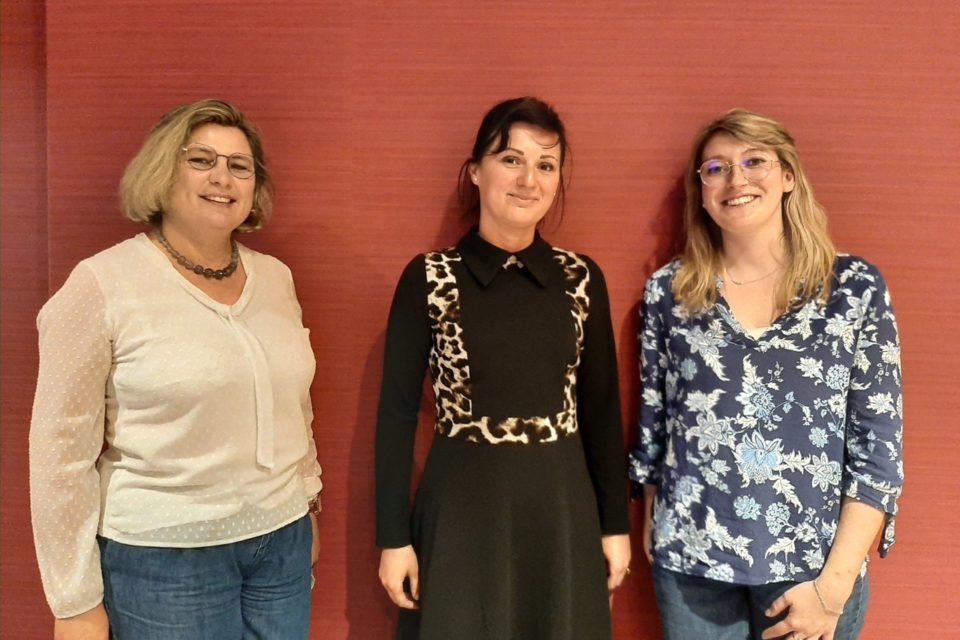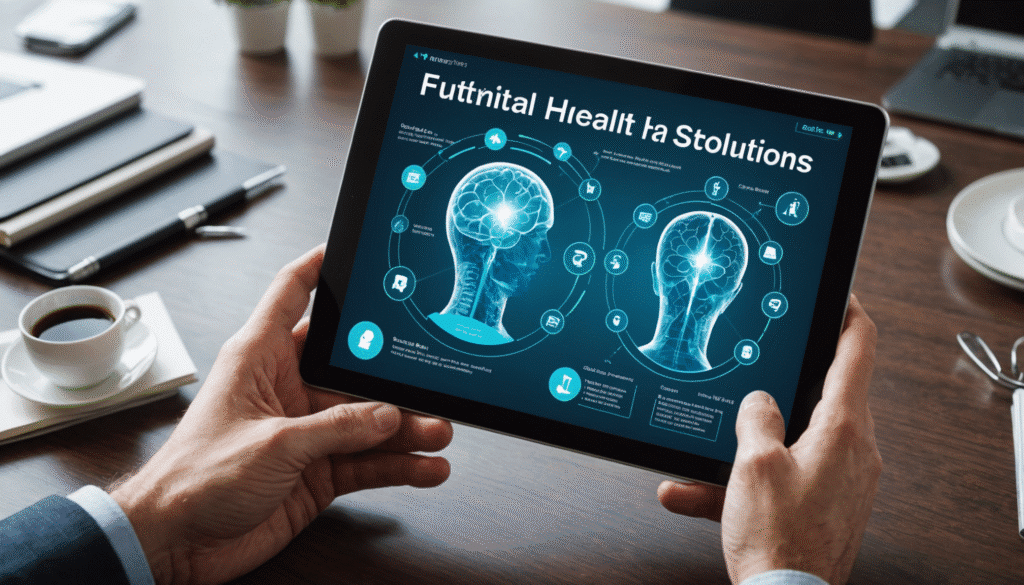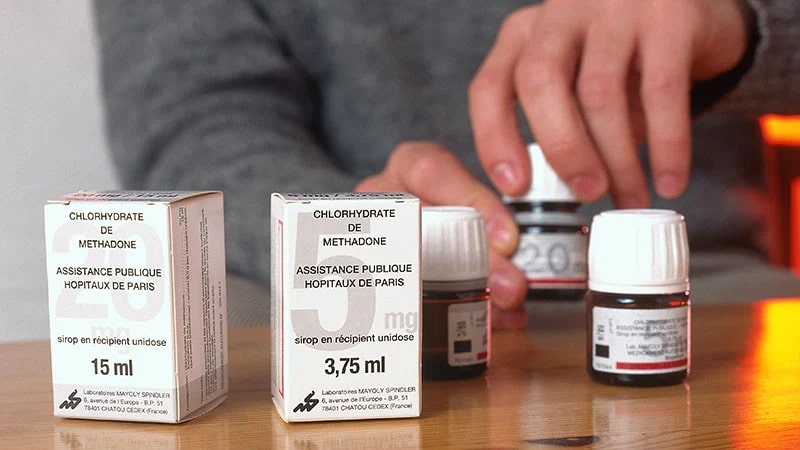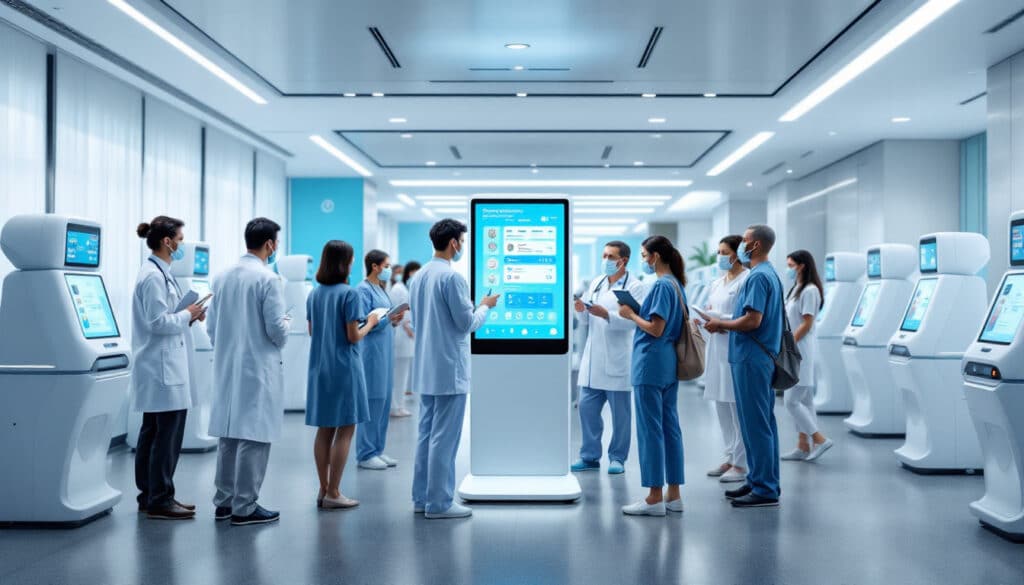“`html
The era of artificial intelligence is redefining the landscape of health. Prestigious institutions are engaging in this technological revolution. Recent advancements promise more precise and personalized care.
Innovative initiatives, such as the Hamilton and Amabel James Center for AI and Human Health at Mount Sinai in New York, perfectly illustrate this transformation. At the same time, Google has inaugurated its own center dedicated to artificial intelligence in Paris, highlighting the growing importance of this technology in the medical field. These centers aim to optimize care delivery through advanced data analysis and genomic tools.
The Mount Sinai Ophthalmic Artificial Intelligence Center plays a crucial role in the early detection and treatment of eye diseases. By using sophisticated algorithms, it revolutionizes diagnostics and significantly improves patient outcomes. This innovative approach opens new perspectives for ophthalmology, offering more effective and accessible solutions.
In France, Ramsay Santé has launched the Médipsy center in Soissons, focused on the mental health of middle and high school students. This unique initiative aims to provide psychiatric follow-up without disrupting education, demonstrating the importance of integrating specialized care into the daily lives of young people. Moreover, efforts are being made to enhance the attractiveness of pediatrics by reducing time constraints and valuing this specialty in medical curricula.
The recent pediatrics conferences highlighted essential proposals, such as recognizing the triangular relationship between the child, parents, and caregivers. These initiatives also emphasize early detection and preventive medical, educational, and social measures, ensuring harmonious development for children. Meanwhile, companies like Alimetry are innovating with portable devices for diagnosing gastric disorders, thereby reinforcing the integration of technology into pediatric care.
What is the AI-Powered Pediatrics Center at Mount Sinai?
The Mount Sinai opens a new center dedicated to pediatrics integrating artificial intelligence (AI) to transform care for children. This innovative center aims to revolutionize the diagnosis, treatment, and medical follow-up of young patients using cutting-edge technologies. Located in the heart of New York, this center benefits from the renowned expertise of the Mount Sinai Health System, one of the largest academic medical systems in the city.
The Hamilton and Amabel James Center for AI and Human Health, recently opened, focuses on the development and application of AI-based tools to improve healthcare precision. By integrating advanced technologies such as genomics and data science, the center aims to personalize medical treatments for each child, thereby increasing the effectiveness of medical interventions and reducing the risk of errors.
This center also stands out for its multidisciplinary approach, bringing together experts in pediatrics, artificial intelligence, computer science, and bioengineering. This interdisciplinary collaboration allows for the creation of innovative solutions that meet the specific needs of pediatric patients. Additionally, the center is committed to conducting in-depth research to develop innovative diagnostic and therapeutic tools, thus contributing to the overall advancement of pediatric medicine.
How is artificial intelligence revolutionizing pediatrics?
Artificial intelligence plays a crucial role in transforming pediatrics by offering innovative solutions for early diagnosis and treatment of childhood diseases. Through machine learning algorithms, doctors can analyze vast amounts of medical data to identify patterns and indicators of diseases that might go unnoticed with traditional methods.
For example, in the context of early detection of autism spectrum disorders, AI helps identify subtle signs in children, thus facilitating quick and effective intervention. Similarly, AI-assisted medical imaging technologies improve the accuracy of ophthalmological diagnoses, allowing for more efficient detection and treatment of eye diseases in children.
Furthermore, AI promotes the personalization of medical treatments by considering the individual genetic and biological characteristics of each patient. This enables the development of tailored treatment plans, thereby increasing the chances of therapeutic success and reducing potential side effects. AI also facilitates the management of medical data, thereby simplifying the coordination of care among various healthcare professionals and ensuring a holistic approach to patient care.
What innovative technologies are deployed within the center?
The pediatrics center at Mount Sinai utilizes a range of cutting-edge technologies to optimize care for children. Among these technologies, advanced medical imaging stands out particularly. By integrating AI-assisted imaging systems, the center is capable of performing more accurate and quicker diagnoses, thus reducing the time needed to identify and treat illnesses.
Moreover, the center uses portable diagnostic devices, such as those developed by medtech-leve-18-millions-de-dollars-pour-un-dispositif-portable-destine-au-diagnostic-des-troubles-gastriques/” target=”_blank”>Alimetry, a medtech that recently raised $18 million for its portable device designed for diagnosing gastric disorders. These devices allow for continuous and real-time monitoring of children’s health, providing doctors with accurate data to dynamically adjust treatments.
The center also integrates genomic analysis tools, allowing for a deeper understanding of the genetic bases of childhood diseases. This genomic approach, coupled with data science, paves the way for targeted and personalized therapies, thereby increasing the effectiveness of treatments and improving prognosis.
Additionally, the center leverages advanced telemedicine platforms, facilitating access to care for children living in remote areas or having difficulty moving. These platforms enable remote consultations, thus ensuring continuous and accessible care for all patients.
What benefits do patients and healthcare professionals gain?
The integration of artificial intelligence in pediatrics offers numerous advantages for both patients and healthcare professionals. For children, this means access to earlier and more accurate diagnoses, leading to more effective treatments and better health outcomes. The speed and accuracy of diagnostics also reduce the stress and anxiety associated with waiting times for medical results.
Parents also benefit from this technological advancement, as it ensures better monitoring of their children’s health and more transparent communication with healthcare professionals. For example, early detection of autism spectrum disorders allows parents to receive early interventions, thereby increasing the chances of optimal development for their children.
For healthcare professionals, AI represents a powerful tool to enhance the efficiency and accuracy of care. Physicians can focus more on the clinical aspects of care, while AI handles data analysis and repetitive tasks. This reduces the workload and allows for better resource allocation, contributing to an overall improvement in the quality of care.
Moreover, ongoing training and collaboration among different disciplines within the center enhance the skills of healthcare professionals, enabling them to stay at the forefront of technological and medical advancements. This synergy fosters a culture of innovation and medical excellence that benefits the entire medical community.
How does this center align with global advances in AI and health?
The new pediatrics center at Mount Sinai fits perfectly into the global trend of integrating artificial intelligence into the health field. On an international scale, numerous institutes and companies are investing heavily in research and development of AI-based tools to improve medical care. For example, the evaluation of new medical imaging technologies in pediatrics is an initiative that reflects the global commitment to using AI to optimize diagnostics and treatments.
The Mount Sinai center joins other major initiatives, such as the opening of Google’s artificial intelligence center in Paris, symbolized by a giant light bulb during its inauguration on February 15. These developments reflect the growing importance placed on AI in the healthcare sector, both in terms of research and practical application.
By collaborating with international partners and exchanging knowledge with other leading institutions, the Mount Sinai pediatrics center contributes to the global rise of medical AI. This collaboration allows for the sharing of best practices, adopting emerging technological innovations, and participating in ethical and regulatory discussions surrounding the use of AI in health.
Additionally, the center is committed to keeping up with trends in digital health and integrating innovative solutions such as telemedicine and connected health devices. This proactive approach ensures that the center remains at the forefront of technology and continues to provide high-quality care tailored to the evolving needs of patients and society.
What future projects and collaborations are planned for the center?
The AI-powered pediatrics center at Mount Sinai continues to grow and plans new projects to strengthen its impact on children’s health. Among future initiatives, the center plans to collaborate with technology companies and research institutions to develop even more advanced solutions. For example, partnerships with startups specializing in portable medical devices could allow for the integration of new continuous health monitoring technologies for children.
Furthermore, the center plans to launch targeted research programs focused on specific pediatric diseases, such as autism spectrum disorders and rare genetic diseases. These programs aim to develop personalized treatments based on in-depth analyses of genomic data and the biological characteristics of patients.
The center also plans to expand its telemedicine services, thereby facilitating access to specialized care for children living in rural areas or facing mobility issues. This expansion will help reduce health inequalities and ensure continuous and accessible care for all young patients, regardless of their geographic location.
Moreover, the center aims to develop training programs for healthcare professionals to familiarize them with AI-based tools and technologies. These programs will ensure optimal use of technological innovations and guarantee that doctors and nurses are prepared to incorporate these tools into their daily practice.
Finally, the center plans to regularly publish its research findings and participate in international conferences to share its discoveries and contribute to global discussions on the future of AI in pediatrics. This transparency and knowledge-sharing emphasizes the center’s position as a leader in pediatric medical innovation.
What is the expected impact on the medical community and health policies?
The opening of this center represents a significant advancement for the medical community, both locally and internationally. By integrating artificial intelligence into pediatrics, the Mount Sinai center establishes new standards for healthcare, encouraging other institutions to adopt similar technologies. This initiative contributes to the creation of a more connected and technologically advanced medical ecosystem, fostering knowledge exchange and interdisciplinary collaboration.
From a political standpoint, this center could influence health policies by demonstrating the tangible benefits of AI in pediatric care. Governments and health organizations may draw inspiration from this model to develop national strategies aimed at further integrating AI into the healthcare system, thereby improving the efficiency and quality of care provided to citizens.
Furthermore, the center could play a key role in the formulation of regulations and ethical standards surrounding the use of AI in health. By working closely with health authorities, the center can help define guidelines ensuring responsible and safe use of artificial intelligence technologies while protecting patient confidentiality and rights.
Educationally, the center could influence medical training programs by incorporating AI skills into the curricula of future doctors and specialists. This ensures that the next generation of healthcare professionals will be well-equipped to use and develop AI technologies, thereby ensuring continuity in innovation and improvement of medical care.
Finally, by demonstrating the success and benefits of AI in pediatrics, the center can encourage greater investment in the research and development of advanced medical technologies. This could stimulate the local economy by attracting investors and tech companies while strengthening New York’s position as a global hub for medical innovation.
# Answer>
The opening of the new AI-Powered Pediatrics Center at Mount Sinai marks a significant advancement in the field of child health. This innovative center integrates the latest technologies in artificial intelligence to optimize the diagnosis and treatment of pediatric diseases, thus offering more precise and personalized care to young patients.
Thanks to the use of AI, the center can analyze vast amounts of medical data in record time, allowing for early detection of pathologies and rapid intervention. This proactive approach not only improves healing rates but also reduces long-term complications, ensuring a better future for the affected children.
Mount Sinai stands out for its commitment to medical excellence and technological innovation. By collaborating with world-renowned researchers and experts in artificial intelligence, the center aims to develop new treatment methods and continuously improve the quality of care provided. This synergy between medicine and technology paves the way for revolutionary discoveries in the field of pediatrics.
Furthermore, the center places particular emphasis on the training and professional development of medical staff. By integrating AI tools into their daily practices, doctors and nurses are better equipped to make informed decisions based on accurate and in-depth data analyses. This enhancement of professional skills contributes to creating a more effective and humane caregiving environment.
Finally, the AI-Powered Pediatrics Center at Mount Sinai plays a crucial role in promoting public health and raising awareness of contemporary pediatric issues. By facilitating access to high-quality care and encouraging ongoing research, this center represents an essential pillar for the future of pediatrics and the well-being of children around the world.










